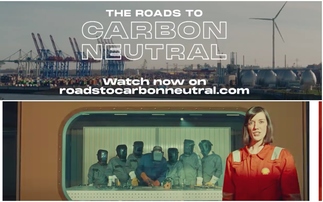Was Clearcast right to ban Iceland's advert highlighting the impacts of palm oil? The answer is complicated - and political
Last week a tweet from Claire Lehman, editor of the libertarian-leaning magazine Quillette, went viral. "Having hundreds of people explaining to me on Twitter that everything from sex to nature to beauty is "political" makes me realise that Western civilisation really hasn't come up with a viable alternative to religion, yet," she wrote. "Until we do, politics will be the opiate of the masses."
Having hundreds of people explaining to me on Twitter that everything from sex to nature to beauty is "political" makes me realise that Western civilisation really hasn't come up with a viable alternative to religion, yet. Until we do, politics will be the opiate of the masses.
— Claire Lehmann (@clairlemon) November 7, 2018
There's a lot to unpack there, but I think my first question would be, 'are you seriously suggesting religion isn't 'political'?"
It was the German philosopher and novelist Thomas Mann - who would no doubt have some interesting thoughts to share on Lehman and her peers in the so-called 'intellectual dark web' - who famously declared that "everything is political". He was right, of course, everything is political - even palm oil.
As Lehman was sparking a Twitter spat over the nature of religion and politics a more mundane, but arguably no less important social media row was kicking off over the decision to block Iceland from broadcasting a Christmas ad highlighting its decision to end the use of palm oil in its own-brand products, on the grounds it had breached rules governing political advertising.
You've no doubt seen the advert by now - it has already totted up nearly 90,000 retweets from Iceland's Twitter account, and more than 3.3 million views on Iceland's YouTube account. But if have missed it you should really check it out, it's quite something, in the grand modern tradition of Christmas supermarket ads no heartstring goes untagged, but this time the message at the heart of the film is one of searing environmental awareness.
You won't see our Christmas advert on TV this year, because it was banned. But we want to share Rang-tan's story with you… 🎄 🐒
— Iceland Foods ❄️ (@IcelandFoods) November 9, 2018
Will you help us share the story?https://t.co/P8H61t6lWu
You've also probably made a snap judgement on whether Clearcast, the agency that clears adverts for commercial broadcast, was right to block the advert or not. But again, as everything is political, there's a lot to unpack here.
The first thing to note is Clearcast's rationale for blocking the ad, which thanks to some opaque initial lines from the agency was only clarified late on Friday. It confirmed that its concerns did "not extend to the content or message of the ad", but the fact the original film was made by Greenpeace meant the ad was deemed to breach the rule stating that "an advertisement contravenes the prohibition on political advertising if it is: An advertisement which is inserted by or on behalf of a body whose objects are wholly or mainly of a political nature".
But was the film really "on behalf of" Greenpeace when it has been modified to make it clear that it is an advertisement for Iceland, who presumably Greenpeace is not actively endorsing? Should it not be judged on its merits as a film in its own right, regardless of its authorship? Is Iceland simply not doing what every company that advertises tries to do: sell more of its product using the best available messaging? The only difference is this time the messaging is focused on environmental credentials rather than taste or cost or convenience, and the content is provided by a famously creative NGO rather than an extortionately expensive ad agency.
Moreover, are Greenpeace's aims "wholly or mainly of a political nature"? It is certainly not party political, nor should it be. But it is obviously political in the broader sense. The organisation famously lobbies and protests for political change, but then so too does virtually every company that advertises. Are all those adverts from fossil fuel majors that dog whistle about the energy security benefits they bring not political? What about all those gambling ads with their 'When the fun stops, stop' logo? For me those are a pretty blatant plea for politicians not to regulate the industry, as much as they are a public health message. What of those charity ads that highlight environmental or humanitarian crises? They are not exactly apolitical, are they? And how about those prestige ads that cut in footage of historic figures with their inspiring and unequivocally political straplines?
Then again, there is also the need to be careful what you wish for. If a corporate could re-badge a film from an environmental campaign group, could another firm re-badge some libertarian agit-prop from their favourite shadily funded 'think tank'? In the long run is it in everyone's interests for the regulators to err on the side of caution when it comes to any form of political advertising?
Did Iceland know the ad would be blocked, as some have alleged, and was simply looking to spin this as a viral social media story? I very much doubt it, on the grounds the ad would have had a wider impact and generated just as much controversy if it had been able to be broadcast. Think about it, you want the ad to reach the X Factor audience, not the professionally woke and angry on Twitter. And then once it has achieved that and generated a few inevitable complaints and contrarian Spectator articles arguing cutting down forests is actually A Good Thing you'd get the online controversy just the same.
Questions, questions. And that is before we even get into the similarly vexed topic of whether Iceland's decision to stop using palm oil is helpful or not. Privately and publicly advocates of sustainable palm oil have responded to the controversy by arguing that simply stopping using palm oil is not much a solution to the current deforestation, and could simply lead to increased demand for other forms of vegetable oil that have their own environmental impacts. The counter argument is that forest cover is still being lost at a shocking rate and sustainable certified palm oil has become a fig leaf for Western companies to feel good about themselves, while global demand for unsustainable palm oil continues to soar.
This complex debate is further complicated by the fact that both sides can make a compelling case. Like the divestment debate there is no clear-cut right answer. There is value in engaging suppliers to improve their behaviour, just as there is value in attempting to publicly deny the worst offenders a license to operate. Each company will have to make their own decision on what works best for them. Either way, the results will be political.
Where do all these questions leave us? More than a little confused, to be honest.
If the advert really was banned because of Greenpeace's involvement then perhaps Iceland should simply remake the ad frame for frame, like that terrible Psycho remake, and resubmit it for when their own brand range goes fully palm oil free next year. Or perhaps they should now go all in and make a truly hard-hitting Christmas ad to highlight palm oil's impact. A Christmas Dinner scene: granny bites into a biscuit, jump cut to a chainsaw felling an ancient tree.
More broadly, Clearcast's clarification on why the ad was blocked is extremely welcome. As more and more companies move to promote their environmental credentials and more and more customers want to hear about them, it is vital to quash the idea that environmental messages are so political they constitute a breach of the rules. Although, you also get the sense these rules are going to be severely tested in the coming years. The idea you can neatly bracket the likes of Greenpeace as too political and the world's advertising industry and the corporate giants that use it as apolitical is going to be greeted with increasing incredulity by Millennial consumers to whom the interconnected nature of environmental impacts and commercial consumption are second nature.
As George Orwell - someone who would also have plenty of interesting thoughts to share about the self-styled 'Intellectual Dark Web' - once observed, "the opinion that art should have nothing to do with politics is itself a political attitude". He could have been talking about an advert on palm oil.
This article first appeared as part of the BusinessGreen Overnight Briefing newsletter, which is available to all BusinessGreen subscribers.









